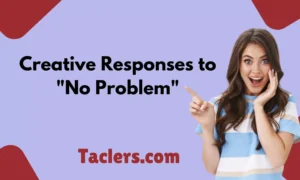We’ve all been there – caught off guard by a comment, a request, or a situation where a quick and clever response is needed.
Whether you’re replying to a blog post, gracefully backing out of a conversation, or borrowing money from friends, having the right words at your disposal can make all the difference. This guide provides smart and polite comebacks for a variety of scenarios, ensuring you handle each situation with grace and confidence.
Submitting a Comment
Why Comments Matter
Comments are a powerful way to engage with content, share insights, and build connections. They show that you’re an active participant in the conversation and that you value the content enough to respond.
Crafting a Thoughtful Response
When crafting a comment, it’s important to be respectful, concise, and value-adding. Here’s a breakdown of how to achieve this:
- Be respectful: Start with a positive note, acknowledging the effort and value of the original post.
- Add value: Share your own insights, experiences, or additional information that complements the original content.
- Keep it concise: Stay on topic and avoid rambling. Aim for clarity and brevity.
Examples of Effective Comments
- Positive Acknowledgment:
- “I really enjoyed this article. Your perspective on [topic] is refreshing and insightful.”
- Adding Value:
- “Great points on [topic]. I’ve found that [additional insight] also works well in similar situations.”
- Concise and Clear:
- “Thanks for sharing this. I’ve been looking for ways to improve my [skill], and your tips are very helpful.”
Canceling a Reply

When to Cancel a Reply
There are times when you may need to back out of a conversation or cancel a planned reply. Understanding the right context to do so can save you from potential misunderstandings.
How to Do It Gracefully
Canceling a reply should be done with courtesy and honesty. Here’s how:
- Acknowledge the initial conversation: Show that you value the interaction.
- Provide a reason: Offer a brief, honest explanation for canceling.
- Remain courteous: Maintain a positive and respectful tone.
Sample Scenarios
- Professional Setting:
- “I appreciate your feedback on my project proposal. Unfortunately, due to a scheduling conflict, I won’t be able to attend the meeting.”
- Social Interaction:
- “Thank you for inviting me to the event. I regret that I won’t be able to make it due to prior commitments.”
- Online Discussions:
- “I was planning to share my thoughts on this topic, but I’ve realized my perspective might not add much value to the current discussion. Thanks for understanding.”
About Reacting Better
Understanding the Need for Better Reactions
In many situations, your reaction can significantly impact the outcome of an interaction. Emotional intelligence plays a key role in managing your responses effectively.
Techniques to Improve Reactions
Improving your reactions involves practicing pause, empathy, and calmness:
- Pause before responding: Take a moment to think before you speak.
- Empathize: Try to understand the other person’s perspective.
- Stay calm: Control your emotions and respond thoughtfully.
Practical Examples
- In the Workplace:
- Situation: Receiving critical feedback.
- Reaction: “Thank you for your feedback. I’ll take this into consideration and work on improving.”
- With Friends:
- Situation: A friend cancels plans last minute.
- Reaction: “I understand things come up. Let’s reschedule for another time.”
- Online:
- Situation: A heated debate in the comments section.
- Reaction: “I appreciate your perspective. Here’s how I see it…”
Good Excuses to Borrow Money from Friends
Borrowing money from friends can be a sensitive topic. It’s important to approach the conversation with transparency, sincerity, and a clear repayment plan. Here are some valid reasons and how to address them:
Emergency Medical Expenses
Justification
Emergency medical expenses can arise unexpectedly and require immediate attention. Explaining the urgency and importance of health-related costs can help your friend understand your situation.
How to Ask
- Be transparent and sincere: “I’m facing unexpected medical expenses and need some help covering the costs. Could you lend me [amount]?”
Repayment Plan
- Propose a realistic way to pay back: “I’ll be able to repay you in installments over the next few months.”
Car Repairs
Context
Reliable transportation is essential for daily life. When your car breaks down, it can disrupt your routine and responsibilities.
Requesting Help
- Frame it as a temporary need: “My car needs urgent repairs, and I need some help to cover the costs. Can you lend me [amount]?”
Home Repairs
Urgency
Home repairs can sometimes pose safety risks if not addressed promptly. Explaining these risks can highlight the importance of immediate action.
Polite Request
- Approach with respect and gratitude: “I’ve run into some urgent home repair issues that I need to fix immediately. Can you help me with [amount]?”
Commitment to Repay
- Outline how and when you will repay the loan: “I’ll repay you in three installments over the next three months.”
Education Costs
Long-Term Benefits
Investing in education can significantly improve your future opportunities. Emphasize the potential benefits of your education.
How to Ask
- Be honest about your financial situation: “I’m pursuing further education to advance my career, but I’m short on funds. Could you lend me [amount]?”
Gratitude
- Express deep appreciation for their support: “Your help means a lot to me. I’ll make sure to repay you as soon as I can.”
Starting a Small Business
Potential Success
Starting a small business can be a promising venture. Sharing your business plan and vision can help your friend see the potential.
Requesting a Loan
- Frame it as an investment: “I’m starting a small business and need some initial funding. Can you lend me [amount]?”
Repayment and Returns
- Discuss potential returns or repayment schedule: “I expect to start making profits within six months and will repay you by then.”
Job Loss
Explaining the Situation
Losing a job can create immediate financial stress. Being open about your job loss can help your friend understand your need.
Requesting Support
- Highlight the temporary nature of your need: “I recently lost my job and need some help covering expenses until I find a new one. Can you lend me [amount]?”
Future Plans
- Share your job search efforts and timeline: “I’m actively looking for a new job and hope to secure one within the next couple of months.”
Helping Family Members
Family Importance
Supporting family in times of crisis is crucial. Stressing this can help your friend understand the urgency.
How to Ask
- Be heartfelt and sincere: “I need to help a family member who’s in crisis and am short on funds. Could you lend me [amount]?”
Repayment Plan
- Offer a clear plan to repay: “I’ll repay you in installments starting next month.”
Wedding Expenses
Special Occasion
Weddings are significant life events that can sometimes exceed planned budgets. Emphasizing the importance of the event can help your friend understand.
Polite Request
- Ask humbly and with gratitude: “I’m facing unexpected wedding expenses and need some help. Can you lend me [amount]?”
Repayment
- Propose a plan to repay after the wedding: “I’ll start repaying you in installments after the wedding.”
Debt Consolidation
Financial Strategy
Consolidating debt can be a strategic move to manage finances better. Explaining how consolidation will help can make your case stronger.
How to Ask
- Be straightforward and honest: “I’m consolidating my debts to manage them better and need some help. Can you lend me [amount]?”
Commitment to Repay
- Outline your repayment strategy: “I’ll repay you in monthly installments over the next six months.”
Unexpected Travel
Urgency
Unexpected travel can arise due to emergencies or important events. Explaining the unforeseen nature can highlight the necessity.
Polite Request
- Ask respectfully and with appreciation: “I need to travel unexpectedly for an important matter and am short on funds. Could you lend me [amount]?”
Repayment Plan
- Share how you plan to repay the loan: “I’ll start repaying you in installments next month.”
Buying a Home
Long-Term Investment
Buying a home is a significant investment. Highlighting the long-term benefits can make your request more reasonable.
How to Ask
- Be transparent about your financial need: “I’m buying a home and need some additional funds to cover the down payment. Could you lend me [amount]?”
Repayment
- Discuss how you will repay the loan: “I’ll repay you in installments over the next year.”
Funeral Costs
Sensitivity
Funeral expenses are often unexpected and can be a financial burden. Approaching the topic with sensitivity is crucial.
How to Ask
- Approach with sensitivity and respect: “I’m facing unexpected funeral expenses and need some help covering the costs. Can you lend me [amount]?”
Repayment Plan
- Offer a clear repayment plan: “I’ll start repaying you in installments next month.”
Conclusion
Handling comments, requests, and reactions gracefully is essential in maintaining positive relationships and effectively managing various situations. By using the tips and examples provided in this guide, you can navigate these scenarios with confidence and poise. Remember, the key is to be polite, sincere, and clear in your communication, ensuring that your interactions are respectful and productive.

Nicholas Clark is a dynamic writer with a knack for capturing the essence of human reactions. With a background in psychology, he delves deep into the science behind every smile, frown, and gasp. His insightful articles on Taclers.com will leave you pondering the fascinating world of human emotions.










